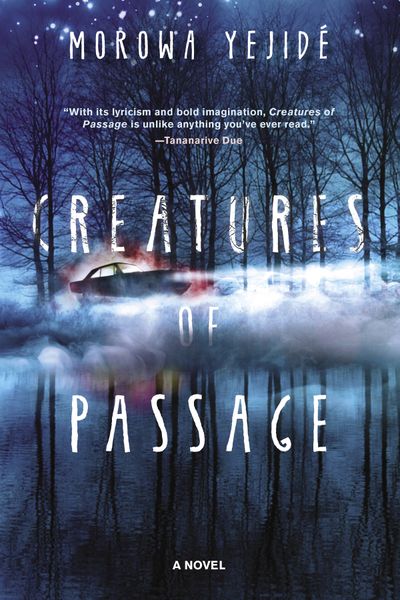‘Creatures of Passage’ navigates mythical version of the District of Columbia

Every once in a while, a novel is so compelling that it changes your sense of place. Morowa Yejidé’s “Creatures of Passage” is that book. It is set in a mythological version of Washington, D.C.’s Anacostia, a predominantly Black neighborhood, sited on a hill across the Potomac with spectacular views of the city.
Yejidé’s characters are so finely drawn, her language so lush and the city’s landmarks so cleverly repurposed within this magical setting, that the fictional place feels as real as the place itself.
Yejidé is a D.C. native who won critical acclaim for her first novel, “Time of the Locust.” “Creatures,” her second, more than fulfills the promise of her first.
Drawing heavily on Egyptian mythology, “Creatures of Passage” tells the stories of Nephthys Kinwell, whose goddess namesake “ferried lost souls through the dark currents of the Great Mystery,” and her twin, Osiris, named for the lord of the Underworld.
In the novel, Nephthys and Osiris are born in the land of the Gullah, fingers conjoined at the pointer. Their half-pointers contain sensory powers; Nephthys’ burns when trouble is brewing.
The book opens in 1977 in an Anacostia devastated by the social and economic impacts of racism. Nephthys drives her haunted 1967 Plymouth Belvedere as a taxi for people broken by life. She is the novel’s beating heart. Overcome with grief after her twin’s disappearance decades earlier, Nephthys numbs her pain with alcohol and provides her passengers comfort.
She takes a colonel’s wife in secret to visit her son in St. Elizabeths (founded in 1855 as the “Government Hospital for the Insane”) because, in the Kingdom of Virginia, “children of respectable families did not have mental illnesses.” At dawn, Nephthys picks up 15-year-old Rosetta, a prostitute shattered by childhood sexual abuse.
The constellation of people surrounding Nephthys – her 10-year-old great-nephew Dash who is witness to child molestation, her estranged niece Amber with the ability to predict death, a man named Find Out, a Howard professor named Dr. Evanston and many more – each carry a story of agonizing tribulation and great strength.
The novel’s title references two types of passage. The first is the lethal Middle Passage to enslavement. Yejidé captures the second type of passage – through, and beyond, death – in the novel’s five sections, each named after a separate stage of the process, from “Moving Through Spaces” to “Entering the Void.”
Osiris embarks on this journey after he is lynched by white vigilantes. He is dumped into the Anacostia River during his first stage, then hurtles through a burning rage, fueled not only by his own murder but by the hit-and-run death of his widow, then pregnant with Amber.
Osiris posthumously stalks his murderers, killing the ringleader in the hospital and traveling to the “blood-soaked hills of the Kingdom of Maryland” where he burns the rest: “Smoking in bed. Electrical fire. Gas oven explosions.”
“Drenched in the sanguinity of chaos,” Osiris celebrates the “brilliant pyre of destruction” before returning to Anacostia in spectral form as the “River Man” discovered by his grandson Dash.
Yejidé’s writing captures real news and spiritual truths with the deftness and capacious imagination of her writing foremothers: Zora Neale Hurston, Toni Morrison and N.K. Jemisin. Yejidé decries the relentless decimation of family and community by white-dominant society.
Shadows speak of “the apocalyptic spread of immunodeficiency viruses … hurricanes and tsunamis swallowing cities whole; radioactive oceans and toxic crops … skyscrapers crashing to the ground … children murdering other children in sunny classrooms … .”
And yet, “Creatures” is threaded with hope, love and connection. Neighbors care for neighbors. Dash’s intuition sews a sundered family back together. The Anacostia River flows on, and the people name “the unnameable, the preposterous and the miraculous in the kingdoms of the land.”
“Creatures of Passage” is that rare novel that dispenses ancestral wisdom and literary virtuosity in equal measure.
M